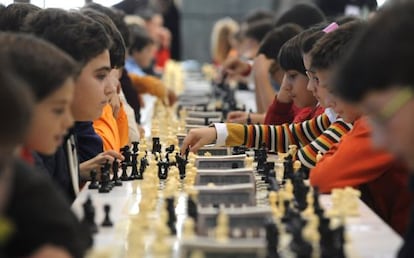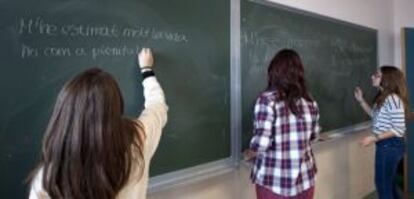Spain’s politicians reach rare education agreement: chess is good
Seldom-seen consensus in Congress over non-binding motion to teach game to students

Introducing chess as a compulsory subject in school is one of the precious few issues that all Spanish political parties seem to agree on.
A non-binding resolution discussed in Congress on Wednesday met with rare support from almost everyone in the room.
The congressional education committee is “asking the government to implement the Chess in School program in the Spanish education system, following the recommendations of the European Parliament.”
The Catalan government recently endorsed one of the most recent scientific studies on the educational benefits of chess. Designed by the universities of Girona and Lleida, the report concludes that students who learn chess at school develop their intellect significantly on several levels, and improve their math and reading scores – the two major weak points for Spanish school kids on the Pisa Report, an international student assessment program.
Modern chess, with its current rules, was invented in Spain a little over 500 years ago”
PP deputy Francisco Cabrera
Carme Sayós, spokeswoman for the Catalan Group in Congress, noted that “we support teaching chess during school hours, as is in fact already the case at many Catalan schools, with very satisfactory results.”
A similar pilot project is currently underway in Cantabria, which is governed by the center-right Popular Party (PP).
This perceived link between chess and intelligence helps explain why the Socialists’ non-binding resolution soon attracted cross-party support in Congress.
Had the initiative been presented as a bill instead, it would have meant making changes to the current education law, a controversial piece of legislation that all opposition parties voted against.
Pablo Martín, the Socialist deputy in charge of defending the initiative, stressed that educational chess “increases strategic abilities and memory, teaches you how to make decisions under pressure, and foments concentration, among many other qualities. And the financial cost is very low.”
The PP spokesman, Francisco Cabrera, was equally vehement in his support, reminding Congress that the European Parliament voted in favor of introducing chess as a subject in March 2012.
He also mentioned studies in Germany where the performance of chess-playing students “has improved 17 percent on average.”

Finally, the conservative politician talked about “Spain’s great relevance in the history and evolution of chess, as modern chess, with its current rules, was invented in Spain a little over 500 years ago. Ours is the country that organizes the most international tournaments since 1988.”
The Basque representative, Isabel Sánchez Robles, called chess “a strategic investment in the future” while the spokeswoman for the United Left, Caridad García, underscored her desire that “soon something similar will happen with philosophy, music and the arts.”
The next step is to bring up the issue with the Education Ministry’s Sectorial Committee, whose decision will be binding.
The president of the Spanish Chess Federation, Javier Ochoa de Echagüen, was present in Congress and said that he has already requested an interview with Education Minister José Ignacio Wert to speed up the process.
“This agreement is not legally binding, but it is a serious political commitment, especially because it was unanimous,” said the Socialist spokesman in Congress, Antonio Hernando, and the education spokesman Mario Bedera, in a joint press appearance.
The Socialists are also aiming to introduce chess as a tool for learning and rehabilitation in penitentiaries, health centers and more.
Tu suscripción se está usando en otro dispositivo
¿Quieres añadir otro usuario a tu suscripción?
Si continúas leyendo en este dispositivo, no se podrá leer en el otro.
FlechaTu suscripción se está usando en otro dispositivo y solo puedes acceder a EL PAÍS desde un dispositivo a la vez.
Si quieres compartir tu cuenta, cambia tu suscripción a la modalidad Premium, así podrás añadir otro usuario. Cada uno accederá con su propia cuenta de email, lo que os permitirá personalizar vuestra experiencia en EL PAÍS.
¿Tienes una suscripción de empresa? Accede aquí para contratar más cuentas.
En el caso de no saber quién está usando tu cuenta, te recomendamos cambiar tu contraseña aquí.
Si decides continuar compartiendo tu cuenta, este mensaje se mostrará en tu dispositivo y en el de la otra persona que está usando tu cuenta de forma indefinida, afectando a tu experiencia de lectura. Puedes consultar aquí los términos y condiciones de la suscripción digital.









































